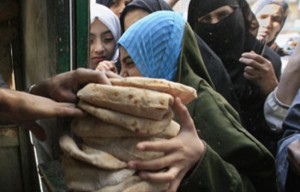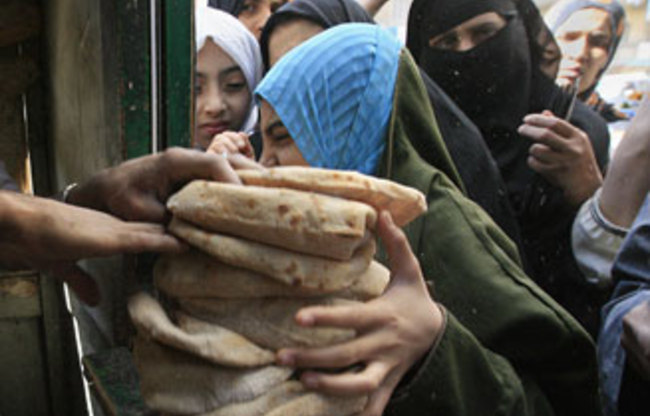
(AFP Photo)
A total number of 222,000 citizens have “voluntarily” deleted their ration cards after deeming themselves “ineligible” for subsidised commodities, according to Minister of Supply Mohamed Abu Shady.
The action was taken through the official website for the ration cards, which was established to facilitate the registration process and collect the needed data for these cards, a statement from the ministry said.
The number of ration cards amounts to 18.2 million, benefiting 69 million citizens, according to official ministry data.
A joint committee will be formed to plan a media campaign which aims at creating a “communal dialogue” on achieving justice in subsidy distribution and determining those who are most eligible for it, Abu Shady said.
Members of the committee will be selected from the ministries of Supply, Finance and Administrative Development. Civil society organisations, the Consumer Protection Agency (CPA) and representatives from public and private media organisations will also participate.
Abu Shady highlighted that the quality of ration card commodities, such as sugar, food oil and rice, has been improved “to better serve the beneficiaries”.
Meanwhile, the General Authority for Supply Commodities (GASC) contracted on Wednesday to buy 240,000 tons of wheat from the US and Russia to be used for producing subsidised bread.
The deal, which was made through an international tender, will be received at the beginning of March, state-run Al-Ahram reported.
Earlier this week, Abu Shady announced that 42,000 tons of rice would be distributed through ration cards, adding that basic commodity reserves are at safe levels and would be sufficient for three months.
On Monday, the Central Bank of Egypt (CBE) held an exceptional auction to sell $1.5bn of its reserves to banks in order to provide their clients with cash needed for importing food commodities, intermediary production components, raw materials, capital goods, spare parts and pharmaceutical components.
Between January and December 2013, inflation rates surged by 10.3%, the Central Agency for Public Mobilization and Statistics (CAPMAS) stated earlier this January.
According to a report published by CAPMAS, Egyptians spend 48% of their income on food goods.



